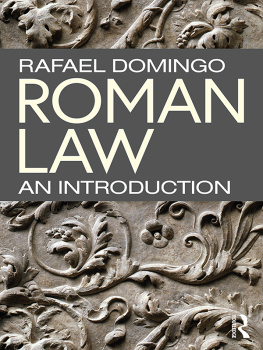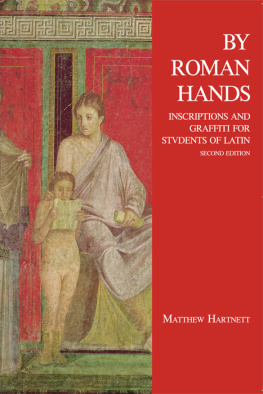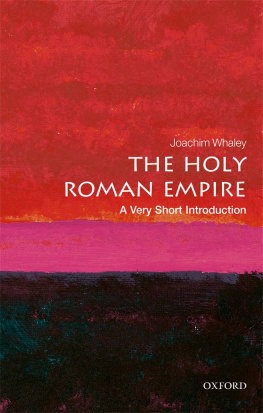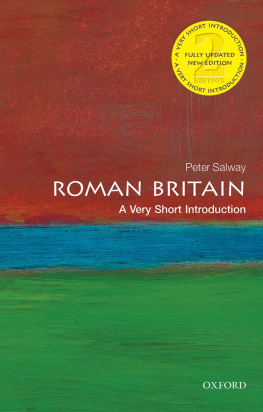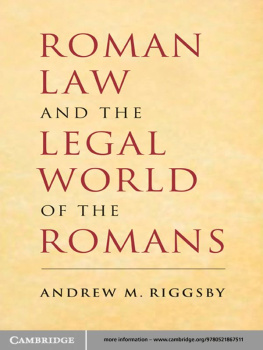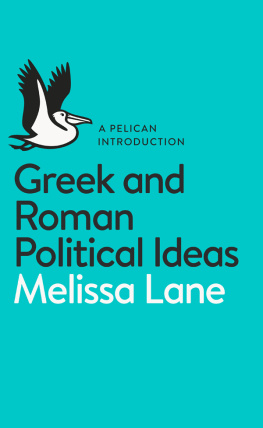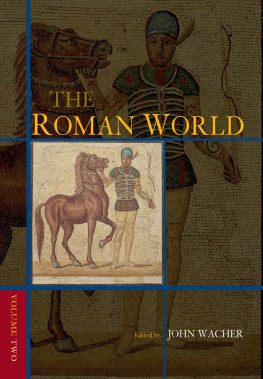Roman Law
Roman Law: An Introduction offers a clear and accessible introduction to Roman law for students of any legal tradition. In the thousand years between the Law of the Twelve Tables and Justinians massive Codification, the Romans developed the most sophisticated and comprehensive secular legal system of Antiquity, which remains at the heart of the civil law tradition of Europe, Latin America, and some countries of Asia and Africa. Roman lawyers created new legal concepts, ideas, rules, and mechanisms that most Western legal systems still apply. The study of Roman law thus facilitates understanding among people of different cultures by inspiring a kind of legal common sense and breadth of knowledge.
Based on over twenty-five years experience teaching Roman law, this volume offers a comprehensive examination of the subject, as well as a historical introduction which contextualizes the Roman legal system for students who have no familiarity with Latin or knowledge of Roman history. More than a compilation of legal facts, the book captures the defining characteristics and principal achievements of Roman legal culture through a millennium of development.
Rafael Domingo (1963, PhD 1987) is the Spruill Family Research Professor at Emory University in Atlanta, USA, and ICS Professor of Law at the University of Navarra, Spain. A specialist in legal history, legal theory, ancient Roman law, and comparative law, he has authored and edited more than twenty books, including Auctoritas (1999), Juristas Universales (2004), The New Global Law (2010), God and the Secular Legal System (2016), and Great Christian Jurists in Spanish History (2018).
Rafael Domingo brings his considerable knowledge of Roman legal science and religion to this wonderfully clear and thorough introduction to Roman law.
Ernest Metzger, University of Glasgow, UK
First published 2018
by Routledge
2 Park Square, Milton Park, Abingdon, Oxon OX14 4RN
and by Routledge
711 Third Avenue, New York, NY 10017
Routledge is an imprint of the Taylor & Francis Group, an informa business
2018 Rafael Domingo
The right of Rafael Domingo to be identified as author of this work has been asserted by him in accordance with sections 77 and 78 of the Copyright, Designs and Patents Act 1988.
All rights reserved. No part of this book may be reprinted or reproduced or utilized in any form or by any electronic, mechanical, or other means, now known or hereafter invented, including photocopying and recording, or in any information storage or retrieval system, without permission in writing from the publishers.
Trademark notice: Product or corporate names may be trademarks or registered trademarks, and are used only for identification and explanation without intent to infringe.
British Library Cataloguing-in-Publication Data
A catalogue record for this book is available from the British Library
Library of Congress Cataloging-in-Publication Data
Names: Domingo, Rafael, 1963- author.
Title: Roman law : an introduction / Rafael Domingo.
Description: Abingdon, Oxon ; New York, NY: Routledge, 2018. | Includes bibliographical references and index.
Identifiers: LCCN 2017056407 (print) | LCCN 2017057469 (ebook) | ISBN 9781351111478 (ebook) | ISBN 9781351111461 (web pdf) | ISBN 9781351111454 ( epub) | ISBN 9781351111447 (mobi/kindle) | ISBN 9780815362753 (hardback : alk. paper) | ISBN 9780815362777 (pbk. : alk. paper)
Subjects: LCSH: Roman law.
Classification: LCC KJA147 (ebook) | LCC KJA147 .D6624 2018 (print) | DDC 340.5/4--dc23
LC record available at https://lccn.loc.gov/2017056407
ISBN: 978-0-815-36275-3 (hbk)
ISBN: 978-0-815-36277-7 (pbk)
ISBN: 978-1-351-11147-8 (ebk)
To Javier Echevarra, in memory
This textbook is designed to be an accessible introduction to Roman law for students of any legal tradition. It is based on more than twenty-five years experience teaching Roman law at the Universities of Cantabria and Navarra in northern Spain, and at Emory University in Atlanta. The volume has been written to support a semester-long course and, thus, to be expanded on by instructors. Understanding it does not require familiarity with Latin or extensive knowledge of Roman history. More than a compilation of legal facts, the book tries to capture the essentials of Roman legal culture. I am convinced that the study of Roman law can help inoculate legal actors today against the virus of legalism and help them to make legal judgments independent of political loyalties, economic interests, and media and social pressures. Furthermore, the study of Roman law inspires a common foundation and knowledge that facilitate understanding among lawyers of different legal cultures. I admire the new efforts of contemporary socio-legal scholarship that tries to separate ancient Roman law from the Romanistic tradition, but I consider it more profitable for students to read a more institutional, even conventional, textbook deeply embedded in the Romanistic tradition.
The great Goethe rightly likened Roman law to a diving duck that hides itself from time to time but is never quite lost; always coming up again alive.1 The study of Roman law is emerging again in our own day because of the need, fostered by globalization, for a common legal vocabulary. As the highly refined terminology of the Roman jurists was unfailingly adopted by legal thinkers to conceptualize international law up to the eighteenth century, it should be adopted again for the conceptualization and development of a new global law. Roman law can serve today as an inspiration toward global constitutionalism, which is inherently postsovereignist, postnationalist, and postpositivist.2 That Roman law was also intrinsically presovereignist, prenationalist, and prepositivist assists constitutionalists in eliminating from global constitutionalism any nonfoundational elements derived from a highly statist paradigm.
The subject treated in this textbook is classical law, roughly developed in the late Republic and the Principate. I have included references to postclassical and Justinian law where I have thought them beneficial for twenty-first-century students. I have said little about early Roman law because of its scant influence on modern legal systems. Many points of Roman law are still controversial, and certain questions about its historical development are especially so. I have tried, however, to avoid these disputed questions, and to lay out the most widely accepted contemporary views, even where I do not fully agree with them. That is so especially in the realms of property law and contract law.
The book is divided into two parts. The first attempts to situate Roman law within its historical context and to trace its development. I provide a brief, concentrated outline of the constitutional and social framework in which Roman law arose and was developed. The second part deals with the practice of Roman law. In selecting topics, I follow the Roman jurists who, without discounting criminal law, devoted more attention to private law. The latter especially the law of property, the law of succession upon death, and the law of contracts stimulated the legal imagination of Roman jurists as no other areas of the law did. Thus, as a matter of fact, private law dominated Roman legal debates, overshadowing public law. Indeed, Roman private law is one of the greatest legal accomplishments of Western culture. At the end of each chapter, I offer a bibliographic selection of books and articles on the subject. The reader, actually an English speaker, will understand my reasonable preference for books written in English. However, I have also included basic references to relevant books in other languages (German, Spanish, Italian, and French).

